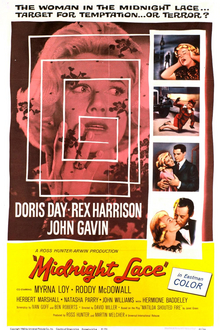Plot
American heiress Kit Preston and her British business owner husband Tony live in a wealthy neighborhood of London in a building undergoing major renovation. Returning home in a dense fog through Grosvenor Square, Kit is startled by a disembodied male voice that threatens to kill her.
When Kit returns to her apartment, she notices a gaunt man staring at her. Moments later, she is nearly injured by a falling girder outside the building, but is pushed out of harm's way by Brian Younger, a contractor working on the renovation. Later, Kit receives a menacing phone call from the same voice she heard in the park, again threatening to kill her. When neighbor Peggy observes Kit's anxiety, she phones Tony who brings Kit to file a report with Scotland Yard. Inspector Byrnes seems to dismiss the incident as Kit seeking attention from her husband.
Kit's aunt, Bea Coleman, arrives in London to visit her. Kit confides in Bea about the recent events and is comforted by her. Shortly after, Tony cancels the couple's planned trip to Venice due to a business obligation. Kit receives another obscene call that Tony attempts to listen in on from another phone, but Kit hangs up, unable to endure the caller's verbal abuse. The next day, Kit becomes trapped in the building's elevator due to a malfunction. A shadowy man approaches the elevator and enters the car through its roof, terrifying Kit, before it is revealed to be Brian, attempting to rescue her. Brian takes Kit to a local pub, where he recounts a near-death experience while he served in World War II.
Several days later, Kit attends a ballet with Tony and Bea, along with Malcolm, the son of Kit's maid Nora, and Charles Manning, the treasurer of Tony's company. During the ballet, Malcolm makes vague threats toward Kit, requesting additional money to help care for his mother. Kit demurs, insisting she will ensure Nora is cared for. Tony intervenes and accuses Malcolm of being responsible for the menacing phone calls Kit has received. During the ballet, Tony's assistant, Daniel Graham, notifies Tony that he has been looking at the books of the company, and it appears a large sum of money has been embezzled from their firm.
Over the ensuing days, Kit becomes increasingly paranoid. After receiving another call, Kit encounters the mysterious gaunt man in her apartment, and screams in horror. Brian hears her screams and rushes to her apartment, but no intruder is located when police arrive. The next day, Kit spots the gaunt man again on the street and is pushed in front of a bus and is nearly killed. Kit begs Peggy to lie to Tony that she has heard the voice of Kit's stalker on the phone, hoping to legitimize her story so that police will take her claims seriously. Peggy complies, but is rebuffed when Tony informs her that the phone has been disconnected all day.
Tony and Bea become convinced Kit is delusional and send her to a psychiatrist. Tony finally agrees to embark on the trip to Venice. Before Tony leaves for a business meeting, the caller phones again. Tony has Byrnes surround the apartment building, hoping to catch the assailant, and pretends to leave. Meanwhile, Brian spots the gaunt man in a pub and follows him. In the darkened apartment, Kit is confronted by the gaunt man, but Tony attacks and incapacitates him. Kit assumes she is safe, only for Tony to reveal that he and Peggy conspired to torment Kit before killing her and staging her death as a suicide, with the motive of inheriting Kit's fortune to repay Tony's business debts. As Tony threatens to murder Kit, it is revealed that the intruder is in fact Peggy's estranged husband, who learned of her affair with Tony, and wants to kill her. Kit escapes the apartment by walking along the construction girders and scaffolding outside the balcony, just as Byrnes and Brian arrive. Brian helps Kit back into the apartment, where Byrnes reveals he discovered Tony's guilt after tapping their phone.

